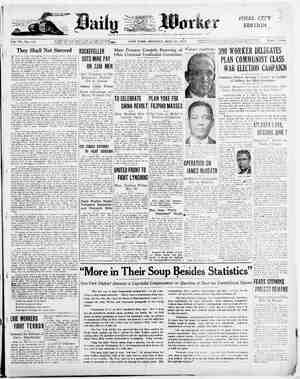Evening Star Newspaper, May 26, 1930, Page 24
You have reached the hourly page view limit. Unlock higher limit to our entire archive!
Subscribers enjoy higher page view limit, downloads, and exclusive features.
THE EVENING STAR, WASHINGTON, D. C., MONDAY, MAY 26, 1930. - e To the Members of the House of Representatives Gentlemen: Would you vote to make unemployment worse? Would you vote to increase wheat or cotton acreage further? No, of course not. No one would deliberately vote to add to unemployment, or to increase farm overproduction. Yet, if you vote for the Reece substitute for the Norris Muscle Shoals blll, you will be voting to enforce additional overpro- duction in the nitrogen and fertilizer industries. Why Try to Force Fertilizer Production by Act of Congress? Is there a shortage of fertilizer? No. Are we confronted with an insuf- ficent supply of nitrogen? . No. Are fertilizer prices too high com- pared with farm products? No. Are nitrogen prices too high? No? The Norris resolution, as passed by the Senate, pro- vides primarily for production of power by a Government corporation, with provision for fer- tilizer research intended to cheapen costs and increase consumption. The Reece substitute, now before the House, inex-’ plicably subordinates production of power and places the stress on further overproduction of fertilizer. INDEX PRICES OF FERTILIZER, FARM. PRODUCTS, FARM EXPENSES, AND COMMODITIES (AVERAGE. 1910-14 =100) 2. Fertilizer prices are less than 10 per cent above pre-war, while the average price of all commodities is nearly 40 per cent above the pre-war level. 3. The bill contemplates also that any lessee shall be forced to produce phosphoric acid. Nitrogen, phosphoric acid and potash constitute the three in- dispensable plant foods. There is already an excess capacity for the production of phosphoric acid in the United States, and other phosphoric acid plants are being built by private enterprise. 4. So far as potash is concerned, Muscle Shoals offers no help whatever, because there are no nearby potash deposits of suitable quality. S. The Reece substitute would compel the manu- facture of complete fertilizer, wholly ignoring the fact that present demand calls for less than 8,000,000 tons and that existing plants have a capacity to pro- We submit that the forcing of nitrogen or fer- duce 12,000,000 tons. tilizer production at Muscle Shoals is uneconomic and inadvisable for the following reasons: 1. Private industry in the United States is pro- ducing 180,000 tons of by-product nitrogen and has installed capacity to produce 140,000 tons of syn- thetic nitrogen annually—the equnvalent of more than 2,000,000 tons of nitrate of soda. - Executive Secretary and Treasurer THE FERTILIZER INDUSTRY FAVORS PRIVATE OPERATION, BUT THE MERE FACT OF PRIVATE OPERATION DOES NOT JUSTIFY AN UNECONOMIC ENTERPRISE. CAPACITY OF SYNTHETIC NITROGEN PLANTS pgowcnofl OF FIXED NITROGEN ’ PRODUCTION OF BY-PRODUCT AMMONIA IN THE UNITED STATES 140,000 THE UNITED STATES R IN THE UNITED STATES (SMORT TONS OF NITROGEN) (SHORT TONS OF NITROGEN) (SHORT TONS OF NITROGEN) INCREASE IN CAPACITY BETWEEN / 1926 AND 1929 105,270 TONS OF NITROGEN ; / The charts above show thag?the Fertilizer Industry is doing its duty. THE NATIONAL FERTILIZER ASSOCIATION Public Relations Committee Charles H. MacDowell, chairman, Armour Fertiliser Works, Chicago. Horace Bowker, the American Agricultural Chemical Co., New York. Charles J. Brand, the N ' Fertilizer Association, Washington. B. H. Brewster, Jr., the L : Sons Co., Baltimore, Md. C. F. Burroughs, F. S. Roy. Guano Co., Norfolk, Va. Spencer L. Carter, Virginia-Carolina Chemical Corp., Richmond, Va. J. Ross Hanahan, Planters’ Festiliser & Phosphate Co., Charleston, S. C. Bayless W. Haynes, Wilson & Toomer Fertilizer Co., Jacksonville, Fla. Warner D. Huntington, the Davison Chemical Co., Baltimore, Md. John J. Watson, International Agricultural Corp., New York, C. G. Wilson, Virginia-Carolina Chemical Corp., Richmond, Va. e e T




